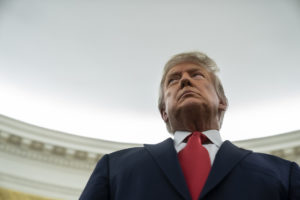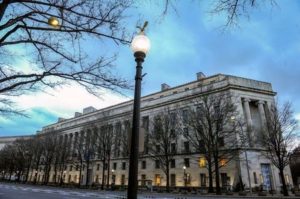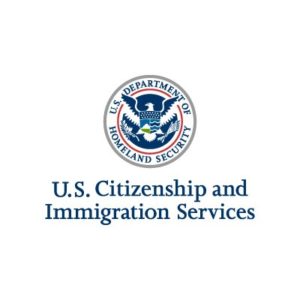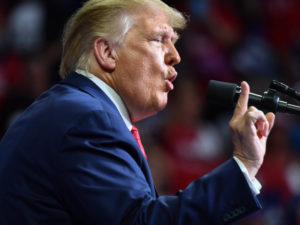 A new lawsuit and economic research have exposed problems with the Department of Labor’s (DOL) new H-1B wage rule. The lawsuit seeks a preliminary and permanent injunction against the new rule, which analysts have concluded was designed to price out of the U.S. labor market H-1B visa holders and employment-based immigrants by raising the required minimum wage to employ them. The research explains why the rule is likely unlawful, harmful to the U.S. economy and will make it difficult for international students to be employed in the United States after graduation.
A new lawsuit and economic research have exposed problems with the Department of Labor’s (DOL) new H-1B wage rule. The lawsuit seeks a preliminary and permanent injunction against the new rule, which analysts have concluded was designed to price out of the U.S. labor market H-1B visa holders and employment-based immigrants by raising the required minimum wage to employ them. The research explains why the rule is likely unlawful, harmful to the U.S. economy and will make it difficult for international students to be employed in the United States after graduation.
“On October 8, 2020, without providing prior notice and without affording plaintiffs or the general public an opportunity to comment, the Department of Labor dramatically altered the manner in which it calculates prevailing wage rates for the H-1B program,” according to a complaint filed on October 16, 2020, by the Wasden Banias law firm on behalf of ITServe Alliance, Dots Technologies, Iflowsoft Solutions, Kolla Soft, NAM Info, Precision Technologies, Smart Works and Zenith Services in the U.S. District Court for the District of New Jersey.
“Plaintiffs bring this civil action challenging the Department of Labor’s decision to set dramatically higher wage rates without following the notice and comment rulemaking procedures required under the Administrative Procedure Act,” reads the complaint. “Plaintiffs also challenge the agency’s new wage rates as a violation of the Immigration and Nationality Act, as amended, because the new wage rates are set under a novel standard that conflicts with the governing statutory criteria. The Department of Labor’s new wage rule is also arbitrary and capricious because the agency relied on outdated, incorrect, or limited empirical data, failed to consider readily available, relevant data and empirical studies, and engaged in reasoning that conflicts with basic economic theory.”
Visit Forbes for full article.
 U.S. President Donald Trump on Thursday extended a pair of immigration bans that block many “green card” applicants and temporary foreign workers from entering the country, measures he says are needed to protect U.S. workers amid the pandemic-battered economy.
U.S. President Donald Trump on Thursday extended a pair of immigration bans that block many “green card” applicants and temporary foreign workers from entering the country, measures he says are needed to protect U.S. workers amid the pandemic-battered economy.
 The 2020 AILA Central Florida Chapter’s Annual Conference was held virtually on December 1st and 2nd, 2020 and was a true virtual learning experience. AILA CFC provided a “Conference in a Box” format with two tracks. The first track covered topics such as analyzing crimes for removal, naturalization and what to do when things go wrong, waivers, lessons in particular social group matter of A-B. Track two covered employment, entrepreneurs/investors, H-1B and PERM, prevailing wages, a practical guide to J-1, PERM from start to finish, alternatives to the PERM, worksite compliance audits and LCA compliance, visa bulletin-priority dates-IVP or AOS, and EB2 to EB3 Downgrades.
The 2020 AILA Central Florida Chapter’s Annual Conference was held virtually on December 1st and 2nd, 2020 and was a true virtual learning experience. AILA CFC provided a “Conference in a Box” format with two tracks. The first track covered topics such as analyzing crimes for removal, naturalization and what to do when things go wrong, waivers, lessons in particular social group matter of A-B. Track two covered employment, entrepreneurs/investors, H-1B and PERM, prevailing wages, a practical guide to J-1, PERM from start to finish, alternatives to the PERM, worksite compliance audits and LCA compliance, visa bulletin-priority dates-IVP or AOS, and EB2 to EB3 Downgrades.
 Tampa Partner Maria Ramos participated as a discussion leader in this past week’s AILA University. Maria and members of AILA’s Business Immigration Response Team (BIRT) addressed AILA members’ most pressing business immigration questions.
Tampa Partner Maria Ramos participated as a discussion leader in this past week’s AILA University. Maria and members of AILA’s Business Immigration Response Team (BIRT) addressed AILA members’ most pressing business immigration questions. A new lawsuit and economic research have exposed problems with the Department of Labor’s (DOL) new
A new lawsuit and economic research have exposed problems with the Department of Labor’s (DOL) new  U.S. Citizenship and Immigration Services (USCIS) today announced it will increase fees for premium processing, effective Oct. 19, as required by the
U.S. Citizenship and Immigration Services (USCIS) today announced it will increase fees for premium processing, effective Oct. 19, as required by the  WASHINGTON—The Trump administration announced an overhaul of the H-1B visa program for high-skilled foreign workers that will require employers to pay H-1B workers significantly higher wages, narrow the types of degrees that could qualify an applicant and shorten the length of visas for certain contract workers.
WASHINGTON—The Trump administration announced an overhaul of the H-1B visa program for high-skilled foreign workers that will require employers to pay H-1B workers significantly higher wages, narrow the types of degrees that could qualify an applicant and shorten the length of visas for certain contract workers. The Trump administration is about to achieve what many see as its long-held objective of bringing the U.S. legal immigration system to a halt. While the administration would not be allowed to stop processing immigration applications without incurring legal action, critics say that through policy choices and mismanagement of U.S. Citizenship and Immigration Services (USCIS) it may accomplish the same goal.
The Trump administration is about to achieve what many see as its long-held objective of bringing the U.S. legal immigration system to a halt. While the administration would not be allowed to stop processing immigration applications without incurring legal action, critics say that through policy choices and mismanagement of U.S. Citizenship and Immigration Services (USCIS) it may accomplish the same goal. A federal appellate court on Wednesday limited an order that had blocked the nationwide implementation of a controversial wealth test for green cards and immigrant visas, allowing the Trump administration to continue the policy in every state except New York, Connecticut and Vermont.
A federal appellate court on Wednesday limited an order that had blocked the nationwide implementation of a controversial wealth test for green cards and immigrant visas, allowing the Trump administration to continue the policy in every state except New York, Connecticut and Vermont. The Trump administration will increase fees on businesses, new citizens and international students who need work authorization. The new fee rule from U.S. Citizenship and Immigration Services (USCIS) is the latest Trump administration action to restrict immigration to the United States and make life more difficult for businesses seeking skilled workers and individuals who want to be American citizens.
The Trump administration will increase fees on businesses, new citizens and international students who need work authorization. The new fee rule from U.S. Citizenship and Immigration Services (USCIS) is the latest Trump administration action to restrict immigration to the United States and make life more difficult for businesses seeking skilled workers and individuals who want to be American citizens.